Are you thinking about heading out this winter to explore nature in pristine snowfall? Many people don’t want to go camping because the temperatures are slightly lower. However, there comes a point where it’s simply too cold to be camping in your RV. How cold is too cold for RV camping?
It is too cold to camp in an RV when the temperatures dip into the -20 F to -25 F range. Sub-freezing temperatures mean you must take precautions such as draining hoses, emptying hold tanks, and using antifreeze. You need to have an emergency plan in place, just in case.
For more information on how low the temperatures can drop while camping in an RV and how to protect yourself from the cold, this guide will help.
Temperature Extremes For Campers and RVs
1. How Cold is Too Cold to Camp in a Camper?
An RV can withstand colder temperatures than you would be able to brave in a traditional tent. However, that doesn’t mean you can always use it when the temperatures dip too low below freezing.
It begs the question: how cold is too cold to camp in a camper?
Generally speaking, you might want to reconsider your camping trip if you think the temperatures will dip below 0F.
You might be okay if the temperatures hover around the zero-degree mark, but you don’t want to be in your camper if they get to -20 F to -25 F.
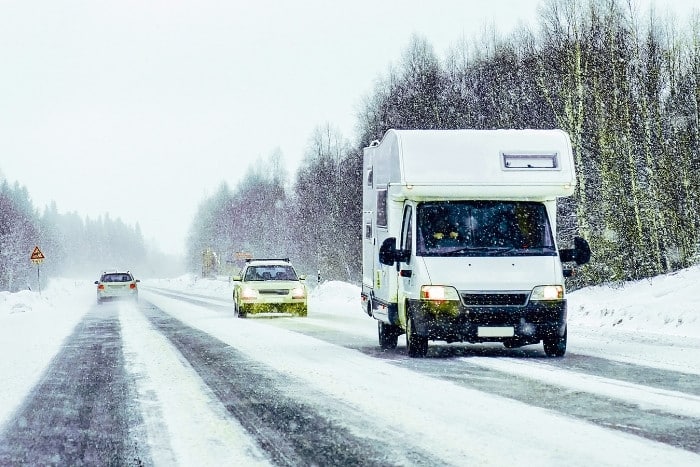
2. How Cold is Too Cold for an RV?
Of course, it isn’t just about what’s best for the camper when it comes to considering how the low temperatures will impact your camping trip.
Your comfort should also factor in how low the temperatures drop. Some of this will depend on your camper and if you have any extreme cold packages installed.
For the most part, insulation is lacking in RVs because they aren’t designed to weather freezing temperatures.
You’ll have a little bit in the walls and floors of the camper, but it won’t be enough to keep you cozy when the temperatures drop below freezing.
You’ll want to ensure that you’re bundled up, just like you would if staying in a tent. That means thick layers, wind-resistant outer layers, and even multiple blankets.
For those who plan to brave sub-freezing temps, you’ll want a zero-degree sleeping bag with down to make you as comfortable as possible.
Because you’re technically inside doesn’t mean you’re safe from things like frostbite or hypothermia. You’ll need to take all of the precautions to keep yourself as warm as possible.
The RV isn’t likely to do much to protect you from the elements once the temperatures dip below freezing.
What Happens If It’s Too Cold for a Camper?
When it’s too cold for your camper, you might wonder what the RV’s real problem is. After all, aren’t they meant to be parked outdoors and to withstand just about any weather condition you can throw at them?
In short, the answer is that you might see extreme damage to your camper if you take it out in weather conditions that it wasn’t designed to handle.
1. Frozen Pipes and Hold Tanks
The first risk you’ll take if you camp in freezing temperatures is that your pipes will freeze. If there’s water in those pipes, you’ll find that water frozen inside the pipes by morning.
While it may be uncomfortable to be without running water for a while, it isn’t the only risk caused by frozen pipes.
When water freezes, its volume expands. Unfortunately, that could force your pipes to accommodate more space than they allow.
The result is burst pipes which are expensive to repair and can make your life extremely difficult for the rest of your camping expedition.
If you have PEX piping, it has a little more flexibility. However, it’s best not to test its capacity too much. Likewise, you’ll also find that your hold tanks can freeze and burst.
If you know that your camping trip will occur in extreme temperatures, it’s best to ensure that you take precautions before hitting the road.
Add some antifreeze solutions to your hold tank to keep it from freezing.
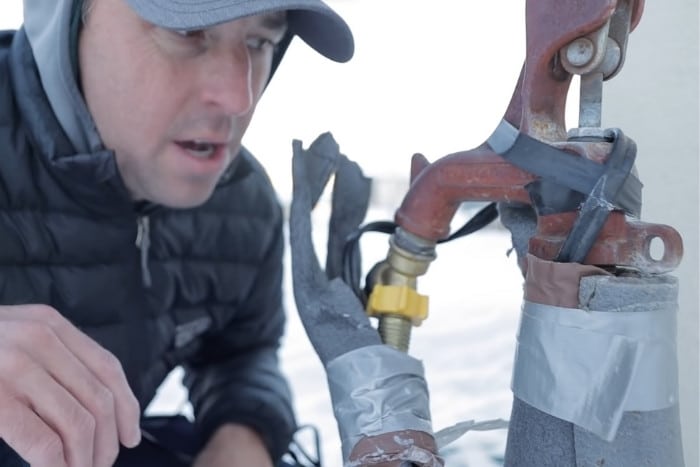
2. No Engine Turnover
Are you worried about how you’ll get home from the campsite if you need to leave? If you’re camping in winter weather, you should be!
Temperatures that are too cold make it hard for your engine to start and turn over. In other words, you may be stranded at the campground until your RV can warm up enough to start the engine.
Depending on the severity of the cold, you might find that your RV needs some repair work before you’ll be able to start it again.
The belts in the alternator that help your camper start can easily crack when the temperatures dip too low. This means that there won’t be any power running to the battery.
How to Avoid Freezing Pipes?
Once the temperatures dip below freezing, it’s important to take measures to ensure the safety of your RV and to keep it functioning at its best.
Burst pipes are a serious risk, but you can do a few things to avoid this issue. It takes just a little preparation, so keep your eye on the weather if you’re going out this winter.
First, you’ll want to ensure that everything containing water or fluids is drained. This means making sure that your water line isn’t hooked up and that it’s been adequately drained of water.
Bring the hoses inside to keep them as insulated as possible, especially if you think there might still be some water inside.
If you must leave it hooked up to your fresh water tank or another water source, leave faucets running slightly overnight to keep water circulating through your pipes.
It’s always best to be prepared for an emergency, so you should plan to have other water sources just in case your pipes freeze.
You’ll need water to drink, even if summer weather isn’t as hot as summer. It’s a good idea to keep about ten gallons of purified drinking water inside your RV.
Regarding your tanks, it’s best to ensure they aren’t at their max capacity when freezing occurs.
Make sure they’re about one-third full or less so that the tank has room to accommodate the extra space the fluids will take up if they freeze. It can also help to add a little antifreeze.
1. Avoid Condensation
One of the main issues plaguing RVs during winter is condensation on the inside of the camper.
As the temperatures fluctuate, you’ll likely notice water droplets forming in the camper, making it cold and moist. It’s important to keep this condensation under control.
Dry it up with towels, and make sure to clean it regularly to prevent mold growth.
If you have the luxury of parking your RV indoors during the winter, keep ventilation high by cracking open a window or skylight.
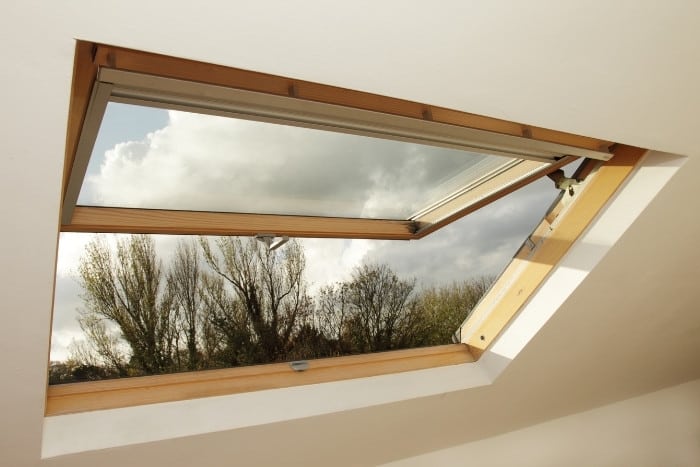
2. Insulate the RV
At low temperatures that hover around freezing or just above, you might be able to stay cozy in your RV with the help of a heater.
You can leave the heater running as often as possible, and it may be comfortable enough to stick with your camping trip.
However, you’ll want to consider if it makes sense to stay once a small heater isn’t enough.
For those who think they’ll spend a great deal of time in their campers over the winter, it may be worth looking into better insulation.
You can purchase an RV with a winter weather package, such as the Yeti Extreme Cold package.
Alternatively, you can make after-market adjustments that will allow you to spend your winters comfortably in your RV.
It’ll take some serious sweat equity (or a hefty payment to a contractor), but it’s a great investment if you plan to camp year-round.
It’s important to keep in mind that insulation won’t last forever. The insulation may have worn down if you use an older RV or camper.
This makes it less likely to keep you warm and may need to be addressed before heading out on a camping excursion.
On the other hand, you may have success installing a heat pump or implementing a propane heater instead of improving the insulation of your RV.
3. Plan for Emergencies
There’s no telling what could happen when you decide to head out during the winter in your camper, especially if the temperatures are going to be dangerously low.
Instead of being surprised, make sure you have a detailed plan of what you’ll do in an emergency to keep yourself warm and healthy without frostbite or hypothermia.
Be sure to let someone else know you’re camping and where you’re going. Have them on standby just in case you need someone to pick you up because the motor in your RV won’t turn over due to the cold.
If you intend to try to tough it out, make sure you have all the supplies you need to survive a storm: drinking water, lots of layers, blankets, and even portable candle heaters to warm up the inside of your camper.
Ensure all these items are accessible inside the RV, so you don’t have to head outside in the elements to get them.
You won’t want to head out in freezing weather to get your heater because it’ll drop your body heat even further.
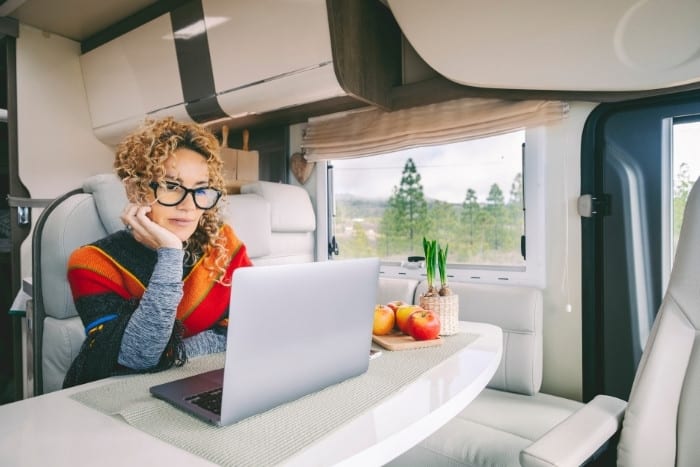
4. Shelter Your RV
Not only is your RV at risk of mechanical issues when the temperatures drop, but it also stands to suffer from damage caused by the weather.
It might seem like a good idea to park it under the trees to break the wind, but this can be equally problematic.
Those tree limbs above you can be loaded with snow and ice, snapping off and landing on your RV’s roof. This results in unexpected damage to your camper’s exterior (and possibly the interior).
Of course, parking right out in the open is also less than ideal. Ice and snow can build up on the outside of the RV.
This makes it more difficult for the camper to remain warm, and the weight can cause issues with the unit’s exterior. Your best bet is to look for a campground that offers shelters for RVs.
These are designed to bear the weight of snow and ice, prevent tree limbs from falling on your roof, and keep ice and snow off the camper.
As a result, it’ll feel just a little bit warm inside your RV, making it easier to brave those chilly temperatures.
5. Check Your Heat Before You Leave
Before you hit the road on your next camping excursion, ensure everything is in working order.
There’s nothing worse than driving an hour away to the campground and settling in for the night only to realize that your furnace won’t light.
Before leaving home, do a dry run and ensure that your heater is functioning correctly. If your furnace runs on propane, ensure you have plenty of supply.
You won’t want to run out while the temperatures are rapidly dropping. Remember that propane pressure will drop as the temperatures dip into freezing.
This means they will need to be fuller if you want them to function throughout a cold winter’s night.
You can take a few precautions even if your camper doesn’t run on propane. Heat pumps will need the filters changed to give you the best airflow.
Cut back on the risk that your heating system will fail by investing in portable heaters that are safe for indoor use.
This gives you a backup system in place and can be used to supplement that heat during the coldest parts of the night.
While these heaters are great for heating small spaces, they’re likely to be used solely for individual use.
You might need more than one if you intend to heat the entire camper this way or if you have a large party spread throughout the RV.
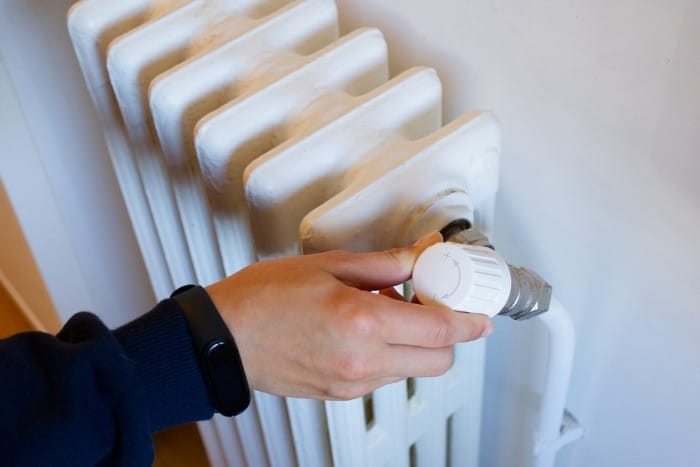
Final Thoughts
Camping in an RV during winter isn’t a foolproof way to brave the elements.
You’ll need to take some serious precautions if the temperatures dip below freezing, especially if they get into the below-zero territory.
Plan for emergencies and stock up on supplies to ensure you’re covered if your camper leaves you high and dry during a bitter cold snap.
